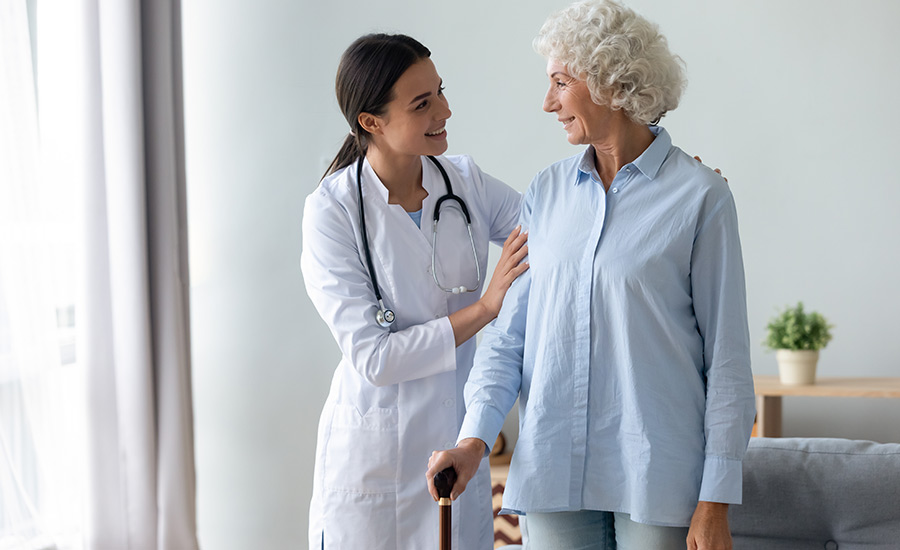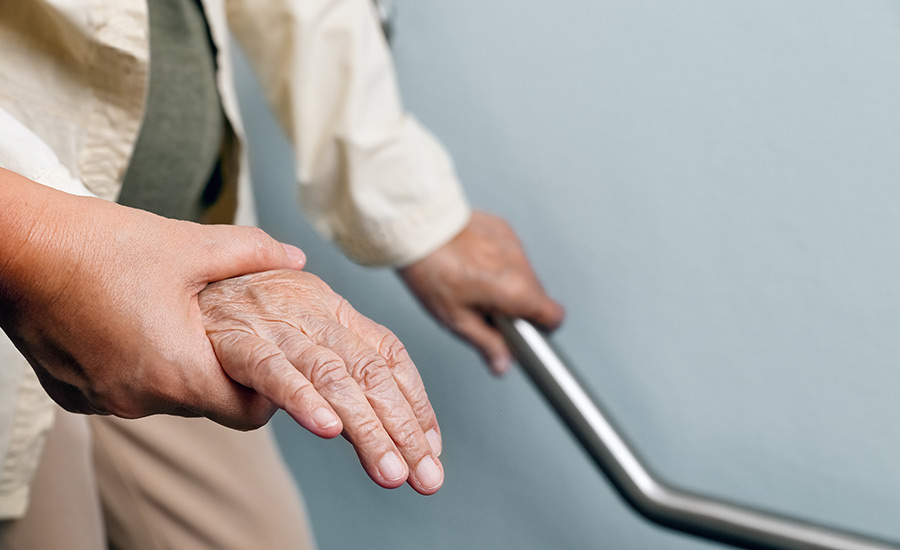Fall Risk Medications + How To Prevent Falls for a Loved One on Medication

As the leading cause of injury among the elderly in the United States, a fall can have a devastating effect on your loved one.
Fall risk medications are one of the culprits that cause the elderly to lose their balance. If your loved one is on this type of medication, active prevention is a vital part of keeping them safe.
We’ll share the top medications that cause falls and explain what you can do to help prevent fall-related injuries for a loved one on medication.
We’ll also explain how our compassionate caregivers at Always Best Care Senior Services can help, by providing fall prevention care for your loved one, ensuring their safety while prioritizing their independence and dignity.
Table of Contents
What Are Fall Risk Medications?
Fall risk medications are prescription medications that can affect your loved one’s balance, coordination, reaction time, and overall cognitive function, making them more susceptible to falls and injuries.
The fall risk arises from a wide range of side effects caused by these types of medications, including dizziness, confusion, and low blood pressure.
Why Do Some Medications Increase Fall Risk?
The reason that some medications can increase fall risk is because of the side effects they are associated with.
These side effects typically include:
- Drowsiness and fatigue: Fall risk medications such as sedatives and antidepressants can cause drowsiness or fatigue, which can decrease alertness and coordination, leading to a higher risk of falls.
- Dizziness and orthostatic hypotension: Antidepressants and blood pressure medications can cause dizziness or orthostatic hypotension — a condition in which your blood pressure suddenly drops when standing up.
- Vision problems: Antipsychotics and antiepileptic drugs can cause vision problems, such as blurred vision or glaucoma. If your loved one’s vision is impaired, it increases their risk of tripping and falling.
- Cognitive impairment: Some medications, including sedatives and antipsychotics can cause confusion and memory issues, interfering with your loved one’s ability to safely navigate their environment.
- Balance and gait problems: Medications like sedatives, antipsychotics, and anticonvulsants can affect the central nervous system, impairing balance and coordination.
- Dehydration and electrolyte imbalances: Diuretics can cause dehydration and electrolyte imbalances, which can lead to dizziness and falls.
- Low blood sugar (hypoglycemia): Antidiabetic medications can lower blood sugar, which can lead to hypoglycemia. Symptoms of hypoglycemia include dizziness, confusion, and weakness — all of which can increase fall risks.
9 Medications That Increase Fall Risk
The most common medications that increase fall risk include:
1. Benzodiazepines
Benzodiazepines are a type of fall risk medication often prescribed for conditions such as anxiety, insomnia, and seizures.
Benzodiazepines calm down the brain’s activities, promoting relaxation.
This type of fall risk medication can cause side effects such as drowsiness, light-headedness, and confusion, which can increase the risk of falls in the elderly.
2. Non-benzodiazepine Prescription Sedatives
Non-benzodiazepine prescription sedatives (also known as “Z-drugs”) are a type of fall risk medication commonly used to help alleviate sleep problems.
Non-benzodiazepine prescription sedatives work similarly to benzodiazepines, slowing down brain activities and promoting sleep.
Just like benzodiazepines, they can cause side effects like drowsiness. Other effects include double vision and memory impairment.
3. Antipsychotics
Antipsychotics are a group of fall risk medications typically prescribed to manage conditions such as schizophrenia, bipolar disorder, and dementia behavioral problems.
Antipsychotics alter the brain’s chemistry, reducing hallucinations and disordered thinking.
This type of fall risk medication can cause side effects such as drowsiness, blurred vision, and even difficulties with movement and balance.
4. Anticonvulsants
Anticonvulsants (also known as antiepileptic drugs) are a type of fall risk medication that treat seizures, bipolar disorder, neuropathic pain, and even migraine headaches.
Anticonvulsants reduce abnormal electrical activity in the brain, which often leads to seizures.
This type of fall risk medication can cause side effects such as dizziness, fatigue, and blurred or double vision.
5. Opioid Analgesics
Opioid analgesics are a type of fall risk medication prescribed to manage moderate to severe pain, chronic pain associated with conditions such as cancer or end-stage arthritis, and acute pain that occurs post-surgery.
Opioid analgesics activate opioid receptors in the nerve cells, reducing the perception of pain. This type of fall risk medication can cause side effects such as drowsiness and confusion.
6. Anticholinergics
Anticholinergics are a type of fall risk medication that treats a wide range of conditions such as gastrointestinal disorders, respiratory conditions, urinary incontinence, and even Parkinson’s disease.
Anticholinergics regulate muscle contractions and body secretions, such as sweat and saliva.
This type of fall risk medication can cause side effects such as blurred vision, drowsiness, and confusion.
7. Antihypertensives
Antihypertensives are a type of fall risk medication that treats high blood pressure or hypertension.
There are different types of antihypertensives, including diuretics, beta-blockers, ACE inhibitors, angiotensin II receptor blockers (ARBs), and calcium channel blockers.
Each type works in a specific way to lower blood pressure:
- Diuretics (also known as water pills) remove excess water and salt from the body through the urine, reducing the volume of blood that needs to be pumped and lowering the blood pressure.
- Beta-blockers reduce blood pressure by slowing down the heart rate.
- ACE inhibitors and ARBs block hormones in the body that constrict blood vessels, helping their blood vessels relax and widen for optimal blood flow.
- Calcium channel blockers prevent calcium from entering the muscle cells of the heart and arteries, causing the blood vessels to relax and open.
This type of fall risk medication can cause side effects such as dizziness, fatigue, headache, or swollen ankles.
8. Antidiabetic Drugs
Antidiabetic drugs are a type of fall risk medication that manages and treats diabetes. There are different types of these medications, including insulin, metformin, sulfonylureas, meglitinides, thiazolidinediones, DPP-4 inhibitors, SGLT2 inhibitors, and GLP-1 receptor agonists. Each type works in a specific way to manage blood sugar. This type of fall risk medication can cause side effects such as low blood sugar and joint pain.
9. Antidepressants
Antidepressants are a type of fall risk medication that helps manage and treat depression and other related mental health conditions such as anxiety disorders, obsessive-compulsive disorder (OCD), and post-traumatic stress disorder (PTSD).
Antidepressants work by balancing brain chemicals that affect mood and emotions. This type of fall risk medication can cause side effects such as blurred vision and dizziness.

How To Help a Loved One on Medication Prevent Falls
If your loved one is on one of the medications above, it’s important to have prevention strategies in place to help reduce the risk of falls.
Here’s how you can help:
- Understand your loved one’s medications: Consult with your loved one’s healthcare provider to understand the side effects of each medication they’re taking, so you know the risks and concerning side effects to look out for.
- Monitor your loved one’s condition: Keep a close eye on your loved one after they take their medicine. Look for signs of drowsiness or confusion, such as complaints of tiredness and difficulty performing everyday tasks. If you notice worrisome side effects, contact your loved one’s healthcare provider immediately.
- Encourage your loved one to exercise: Balance and sit-to-stand exercises can help improve strength and coordination, reducing the risk of falls.
- Make sure your loved one’s home is safe: Ensure your loved one is living in a safe environment by checking the home using a home safety checklist. Remove tripping hazards such as clutter, loose rugs, or cables. Install grab bars and handrails in the bathroom and on stairs, and ensure frequently used items are within reach. Make sure that your loved one’s home is also well-lit, and consider installing light switches at the top and bottom of stairs.
- Make sure your loved one wears proper footwear: Encourage your loved one to wear shoes that properly fit and have non-slip soles.
- Make sure your loved one uses mobility assistive devices: Mobility assistive devices such as canes, walkers, wheelchairs, and scooters can help provide stability for your loved one and improve their balance.
- Make sure your loved one stays hydrated and eats a balanced diet: Encourage your loved one to drink six to eight glasses of water a day and eat food rich in antioxidants, as dehydration and malnutrition can aggravate the side effects of medications, increasing the risk of falls.
- Regularly check your loved one’s hearing and vision: Vision and hearing play a crucial role in balance and spatial orientation, as they provide key information about the environment that helps maintain stability and avoid obstacles. Regular check-ups can ensure that impairments are identified and properly managed.
- Talk to your loved one about the risks: Make sure your loved one understands the potential side effects of their medications and the importance of safety measures.
- Utilize a medical alert system: Consider using a medical alert system, such as a necklace or wristband with a help button, so your loved one can call for help in case of an emergency.
- Ask your loved one’s physician for a medication review: If your loved one is taking multiple medications, ask them to perform a prescription evaluation to determine whether there are safer alternatives or reduce medications, if possible.

Fall Prevention & Care at Always Best Care Senior Services
Always Best Care Senior Services was founded with the heartfelt intention of providing optimal senior care. Our compassionate and dedicated team is committed to offering unwavering support and dependable care for your loved one.
Operating in over 200 locations, we understand that each individual’s needs are unique, which is why we offer a personalized approach to meet the specific requirements of you and your loved one.
At Always Best Care, we devise a personalized care plan for every client, which includes fall prevention for the elderly. This care plan is meticulously created based on a comprehensive fall risk assessment that is evaluated by our team using the Balance Tracking System.
Our team of professional caregivers is committed to ensuring your loved one’s safety while fostering their independence and dignity.
Our fall prevention services allow us to:
- Provide your loved one with a safe living environment by identifying risk factors in their home
- Offer supportive assistance with daily tasks that may pose a risk for falls
- Provide personal care services, such dressing, bathing, and assistance in mobility tasks
Our additional care services include:
- In-home care services: We offer services ranging from around-the-clock care and fall prevention to nutrition monitoring, thoughtful meal preparation, heartfelt companionship, attentive overnight care, and beyond. Our dedicated team looks after your loved one within the familiar and comforting surroundings of their own home.
- Skilled home health care: We provide personalized home care plans for your loved one’s special needs or illness recovery, including chronic disease management and personal care services. Available at select locations.
- Respite care: We offer temporary comprehensive care for your loved one, so you can catch up on sleep, spend quality time with other family members or manage other errands. You can confidently step away knowing that your loved one is in expert hands.
- Specialized home care: We monitor your loved one’s health by utilizing advanced care methodologies and cutting-edge technology, such as remote patient monitoring, digital balance assessments, and an intuitive personal emergency response system.
- Senior living referral services: We can help you make informed decisions about your loved one’s living arrangements, recommending assisted living communities with 24/7 emergency care, medical services, personal care, housekeeping, and social activities.
- Veterans assistance program: We help you find the highest quality of care for your veteran loved one by securing financial resources for their care and ensuring they are treated with utmost respect and attention.
At Always Best Care Senior Services, we’re here to guide you every step of the way.
Our compassionate and skilled professionals are ready to provide quality care for your loved once, giving you the peace of mind knowing that your loved one is in good hands.





